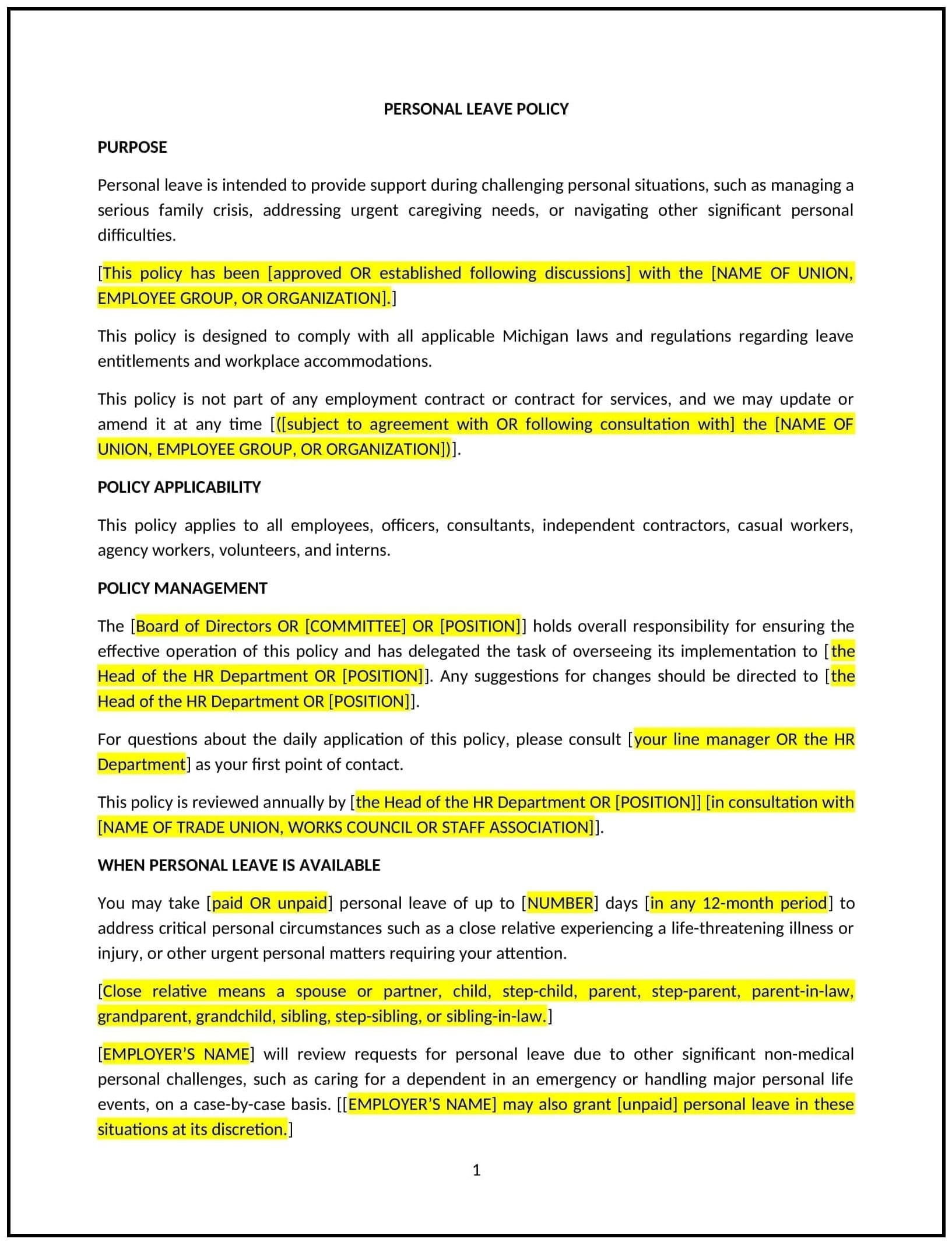Got contracts to review? While you're here for policies, let Cobrief make contract review effortless—start your free review now.

Customize this template for free
Personal leave policy (Michigan)
A personal leave policy outlines the guidelines for Michigan businesses regarding time off for personal reasons, such as illness, family emergencies, or personal matters that do not fall under other specific leave categories. This policy specifies how employees can request personal leave, the conditions for approval, the duration of leave, and how the time off will be handled in terms of compensation and benefits. The policy aims to balance the needs of the business with employees' personal needs.
By adopting this policy, businesses can support their employees' well-being while ensuring continuity of operations and minimizing disruptions caused by absenteeism.
How to use this personal leave policy (Michigan)
- Define eligible reasons for personal leave: Clearly specify the types of situations that qualify for personal leave, such as illness, family emergencies, or urgent personal matters that require time off. Exclude reasons covered under other policies like vacation or sick leave.
- Set eligibility criteria: Specify any eligibility requirements for personal leave, such as the length of employment or accrual of certain benefits (e.g., employees may need to be with the company for a specific time period before qualifying for personal leave).
- Establish the process for requesting leave: Outline the process employees should follow to request personal leave, including how much notice is required, any necessary documentation (such as medical certificates), and the preferred method of communication.
- Define the duration of personal leave: Specify the maximum amount of time employees are allowed to take off under personal leave, and how leave will be granted (e.g., on an hourly, daily, or weekly basis).
- Compensation during leave: Clarify whether personal leave will be paid or unpaid. The policy should outline the expectations for compensation, including whether employees can use other benefits like paid time off (PTO) or vacation days while on personal leave.
- Address benefits continuation: State how employee benefits (such as health insurance, retirement contributions, and other perks) will be handled during personal leave. For example, businesses may continue to provide benefits during paid personal leave, while employees may need to cover premiums during unpaid leave.
- Protect job security: Ensure employees are aware that their job or an equivalent role will be held for them while on personal leave, and outline the terms under which they can return to work.
- Address multiple requests: Clarify the procedure for handling repeated or extended personal leave requests, including whether there are limits on how often personal leave can be taken and whether extended leave may impact employment status.
- Review and update the policy regularly: Periodically review the policy to ensure it remains compliant with Michigan state laws and is aligned with the evolving needs of the business and its employees.
Benefits of using this personal leave policy (Michigan)
This policy provides several key benefits for Michigan businesses:
- Supports employee well-being: By offering personal leave, businesses demonstrate care for their employees' personal needs, fostering a positive work environment and promoting work-life balance.
- Reduces absenteeism: Clear guidelines for personal leave help employees understand when and how they can take time off, reducing unscheduled absenteeism and preventing disruptions.
- Promotes fairness: A well-defined personal leave policy ensures that all employees have equal access to time off for personal reasons, promoting fairness and transparency within the workplace.
- Minimizes legal risks: By adhering to Michigan state laws and federal regulations regarding leave, businesses can reduce the risk of legal challenges or claims of discrimination related to employee time off.
- Enhances employee retention: Employees are more likely to remain with an employer that values their personal well-being and offers flexible leave options for personal matters.
- Improves business continuity: A clear personal leave policy ensures that businesses can plan for absences, minimize operational disruptions, and manage workloads effectively during periods of employee leave.
Tips for using this personal leave policy (Michigan)
- Communicate the policy clearly: Ensure all employees understand the personal leave policy by including it in the employee handbook, during onboarding, and in regular reminders about leave benefits.
- Be flexible with leave requests: While the policy should set clear guidelines, businesses should be flexible in accommodating employees' needs for personal leave, especially during emergencies or unanticipated circumstances.
- Maintain consistency: Apply the personal leave policy consistently across all employees to avoid any appearance of favoritism or unfair treatment.
- Track leave requests: Keep accurate records of personal leave requests, including dates, durations, and reasons for leave, to ensure that the policy is followed and that there are no discrepancies.
- Review and update regularly: Periodically review the personal leave policy to ensure it is up to date with changes in Michigan state laws, business practices, and the needs of employees.